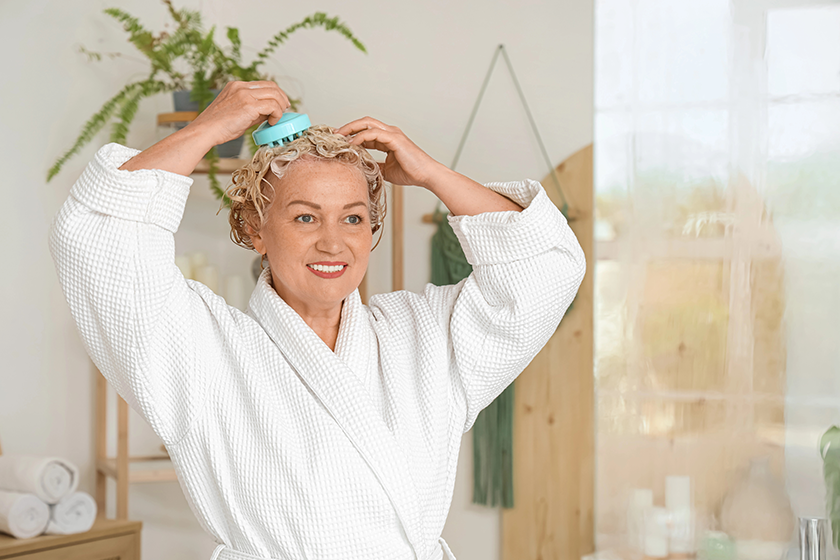Maintaining personal hygiene is essential for everyone, including our elderly loved ones. However, as people age, their hair and scalp can undergo significant changes that require adjustments to their hair care routines. A common question many caregivers and family members ask is, “How often should an elderly person wash their hair?” This blog post will discover the factors influencing this decision and provide expert tips for proper hair care for seniors.
Understanding Hair and Scalp Changes in the Elderly
First, it is important to understand changes in the hair and scalp as one grows older.
Thinning Hair and Reduced Oil Production
As individuals age, their hair often becomes thinner and more delicate. The scalp also produces less sebum, the natural oil that keeps hair moisturized. These changes can lead to dry, brittle hair that is more prone to breakage. Therefore, the hair care routine that worked well in younger years might need to be adjusted for elderly individuals.
Increased Sensitivity
The scalp can become more sensitive with age, making it crucial to use gentle hair care products and techniques. Harsh shampoos and frequent washing can irritate the scalp, leading to discomfort and potential skin issues.
Determining the Right Washing Frequency
Here is how to determine how often an elderly person should wash their hair.
Personal Hygiene and Comfort
How often an elderly person should wash their hair depends on several factors, including their hygiene habits, comfort, and specific hair and scalp conditions. Generally, washing hair once or twice a week is sufficient for most seniors. This frequency helps maintain cleanliness without stripping the scalp of essential oils.
Scalp Condition
For seniors with particularly dry or sensitive scalps, washing hair less frequently may be beneficial. In such cases, once a week might be adequate to avoid further drying out the scalp and causing irritation. On the other hand, seniors with oily scalps might need to wash their hair more often, perhaps two to three times a week, to keep the scalp clean and comfortable.
Activity Level
The activity level of an elderly person also plays a role in determining the frequency of hair washing. More active individuals who sweat regularly might need to wash their hair more frequently to prevent sweat buildup and maintain scalp hygiene. Conversely, less active seniors might find that washing their hair once a week is sufficient.
Tips for Proper Hair Care for Seniors
Here are some tips to maintain good hair care.
Use Gentle, Moisturizing Shampoos
Selecting the right shampoo is crucial for elderly individuals. Opt for gentle, moisturizing shampoos that are free from harsh chemicals and sulfates. These shampoos help maintain the natural moisture balance of the scalp and hair, preventing dryness and irritation.
Incorporate a Conditioner
Using a conditioner after shampooing can provide additional moisture and help detangle the hair, making it easier to manage. Look for conditioners specifically formulated for dry or aging hair, as they often contain nourishing ingredients like vitamins, oils, and proteins.
Avoid Excessive Heat Styling
Heat styling tools, such as hair dryers, curling irons, and straighteners, can damage aging hair, making it more prone to breakage. Encourage elderly loved ones to let their hair air dry whenever possible and limit the use of heat styling tools. If using a hair dryer is necessary, use it on a low heat setting and keep it at a safe distance from the scalp.
Regular Trimming
Regular haircuts can help maintain the health of an elderly person’s hair. Trimming the hair every six to eight weeks helps remove split ends and prevent further breakage, keeping the hair looking neat and healthy.
Special Considerations for Seniors with Health Conditions
For seniors with health conditions, take special consideration.
Mobility and Dexterity Issues
Seniors with mobility or dexterity issues may find it challenging to wash their hair independently. In such cases, caregivers can assist to ensure that hair washing is done safely and comfortably. Using a detachable showerhead or a no-rinse shampoo cap can make the process easier for both the caregiver and the elderly individual.
Scalp Conditions
Certain scalp conditions, such as dandruff, eczema, or psoriasis, may require specific hair care routines. Consult with a healthcare provider or dermatologist to determine the best approach for managing these conditions. They can recommend suitable products and washing frequencies tailored to the individual’s needs.
Cognitive Impairments
For caregivers of the elderly with Alzheimer’s disease, dementia, or other cognitive impairments, approach the task with patience and gentleness, creating a calm and reassuring environment to minimize stress and confusion. If necessary, assisted living options may be a good choice as well.
Finding the Right Balance for Hair Care in Seniors
Understanding how often an elderly person should wash their hair is important for maintaining their overall scalp health and comfort. While the general recommendation is to wash hair once or twice a week, individual factors such as scalp condition, activity level, and specific health needs should be considered. At our retirement community, we provide personalized care to help seniors maintain healthy and manageable hair. Our team assists with hygiene routines, ensuring comfort and proper care tailored to each resident’s needs. Contact us to learn more about how we can support your loved one’s hair care routine.







